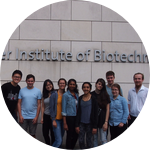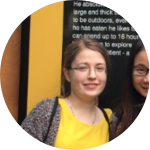About This Project
Blood alcohol and sweat alcohol levels are linearly correlated [1]. Currently, an affordable, discreet and portable way to easily track blood alcohol concentration reliably is not available. So, we plan to develop a device that tracks ethanol concentration in sweat; the ‘AlcoPatch’. This solution could increase self-awareness, encourage responsible drinking and reduce undesired consequences of being drunk. We will be engineering E.coli to detect ethanol and respond with a visible colour change.
Ask the Scientists
Join The DiscussionWhat is the context of this research?
'2.5 million people drank more than 14 units of alcohol on their heaviest drinking day' - as quoted in Office for National Statistics (2014). After noticing that drinking is a problem not just in Manchester but also in the rest of the UK, Manchester iGEM team began research on various methods of measuring alcohol intoxication. We then realised that a cheap and reliable product was not easily available. In line with synthetic biology, we decided to design our ‘AlcoPatch’.
We feel this will appeal to audiences from all walks of life as the patch could be something to enjoy and also be useful. Furthermore, people could conceal the device with ease to avoid any embarrassment.
What is the significance of this project?
Quite often, people are unaware of how much alcohol they have consumed, leading to uncontrolled consumption. What is needed is a simple, cheap and easy way of detecting how much they have drunk. Currently the standard device for this is the ‘breathalyzer’ which is big, bulky and expensive. People can purchase disposable breathalyzers online, but they are often unreliable or very costly.
We are researching a new method which uses a person’s sweat to detect blood-ethanol concentration. The biological compounds in the AlcoPatch will react with the ethanol present in a person's sweat, causing a color change. Our ‘ÁlcoPatch’ would be an affordable, personal intoxication awareness tool. Our ambition would be to make this device easily accessible to everyone around the world.
What are the goals of the project?
We aim to use two different mechanisms to build our AlcoPatch. The first is a cell-free system that utilises purified protein extracts. The second mechanism is an inducible gene switch that revolves around the manipulation of E.coli to express coloured proteins (chromoproteins) based on ethanol concentrations.
To achieve these aims, we use an array of laboratory techniques: fluorescence imaging and quantification, protein expression and purification, DNA cloning, polymerase chain reaction (PCR) etc. These techniques require materials such as primers, enzymes, kits etc.; which can cost over $3000 throughout the course of a single project.
Please see the budget section for more specific items we need to continue our research. With your kind support, we can make our AlcoPatch a reality.
Budget
We have been provided funding from Manchester Institute of Biotechnology (MIB) and Faculty of Life Sciences (FLS), which will only be enough to send 6 of our team members to the iGEM Giant Jamboree in Boston. However, our team consists of 10 members and we would need an additional $6000 for the entire team to attend the iGEM Giant Jamboree in Boston. We also need additional funding for lab materials such as DNA kits, restriction enzymes and primers to ensure that we can complete our experiments successfully.
Due to the nature of the crowdfunding website, we feel comfortable setting our target for $3000 since this is enough to send the minimum number of team members to represent this project in Boston.
Note: The amount stated in the pie chart for registration, flight ticket and accommodation is only for one individual.
Endorsed by
Meet the Team
Affiliates
Team Bio
Our team consists of undergraduates studying biology related degrees who will lead the experimental research of this project. We also have students studying engineering, physics and maths, who are in-charge of mathematical modelling and web designing. There is also a linguist undergraduate that excels in outreach and human practice collaborations. The diversity of nationalities in the team is a unique characteristic of our team.
Manchester iGEM 2016
We are a group of 10 undergraduate students based in Manchester Institute of Biotechnology participating in a synthetic biology competition - International Genetically Engineered Machine (iGEM).
James Riley
Human practises & Outreach personnel in the Manchester iGEM 2016 team. I'm currently studying Linguistics BA with additional modules is sociology and psychological studies at The University of Manchester. I like to appear in the occasional video too! ;)
Prakrithi Narayanan
Administrative Executive and wet lab member of the Manchester iGEM 2016 team. Currently studying Bsc (Hons) Biomedical Science at the University of Manchester. I'm an avid photographer and blogger too!
Tobias Summerill
Modelling and analytics officer of the Manchester iGEM 2016 team. Currently heading into the 4th year of my masters in theoretical physics. My focus is on the modelling and mathematical side of the project, with most of my time spent thinking about models and how they can be used to assist the others.
Wei Hao Tey
Sponsorships and financial officer of the Manchester iGEM 2016 team. Undergraduate student studying Mathematics at the University of Manchester passionate with problem solving and computer programming.
Matthew Davies
Modelling and analytics officer of the Manchester iGEM 2016 team. Currently heading into the 4th year of my M.Eng Chemical Engineering degree. My focus is on the modelling and mathematical side of the project, with most of my time spent staring at MATLAB or scribbling away equations on a whiteboard.
Sathya Darmalinggam
Wet lab supervisor of the Manchester iGEM 2016 team. Currently studying Bsc (Hons) Biomedical Science at the University of Manchester. Love playing around with E.Coli in the lab!
Guadalupe Alvarez
Experimental Officer and Wet Lab Member of the Manchester iGEM 2016 team. Currently studying BSc (Hons) Biology at the Manchester Metropolitan University. Enjoy the lab and communicating science!
Kashmala Carys
Hi! I'm the Public Relations Coordinator and a Wet Lab Member. I am studying Bsc (Hons) in Molecular Biology with a year in Industry at the University of Manchester . I love getting stuck into the lab work and honing in on techniques that will carry me into my future. However, the most amazing thing about iGEM is that is has shown the importance of how work outside the lab is crucial to being a successful scientist; from pitching to companies, to inspiring the next generation. In my spare time I enjoy singing as part of Acappella and posting on our UoM iGEM Facebook page!
Hui Wen Chong
Creative Director and Wet Lab Member of the Manchester iGEM 2016 team. Undergraduate student studying Biology at the University of Manchester. If you've never met an artsy biologist, here's one! :D
Svetlana Telnova
Wet Lab Member of the Manchester iGEM 2016 team. Studying at the Faculty of Life Sciences at the University of Manchester.
Lab Notes
Nothing posted yet.
Additional Information
Check out our wiki : http://2016.igem.org/Team:Manc... (It's still under construction)
Like us on facebook : https://www.facebook.com/uomig...
Follow us on twitter : https://twitter.com/iGEMManche...
* E.coli refers to Escherichia coli
References:
(1) Buono, M.J. (1999) ‘Sweat ethanol concentrations are highly correlated with Co-Existing blood values in humans’, Experimental Physiology, 84(2), pp. 401–404. doi: 10.1111/j.1469-445x.1999.01798.x.
Project Backers
- 163Backers
- 69%Funded
- $2,064Total Donations
- $12.59Average Donation













